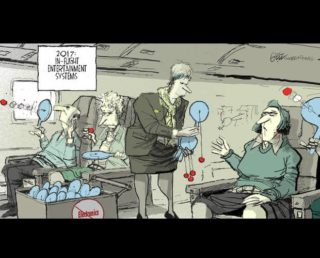U.S. Vice President Joe Biden has warned Russia that “time is short” to avoid further sanctions, saying Moscow must begin withdrawing the tens of thousands of troops it has massed at the Ukrainian border.
On a visit to Kiev meant to demonstrate U.S. solidarity with the embattled government here, Mr. Biden also said that Russia must honour a pact it signed last week in Geneva by pressing pro-Russian militants in the east of Ukraine to give up their weapons and surrender the government offices and police stations they have seized in at least 10 cities.
“No nation should threaten its neighbours by amassing troops along the border. We call on Russia to pull these forces,” Mr. Biden said after meeting with Ukrainian Prime Minister Arseniy Yatsenyuk. “We’ve heard a lot from Russian officials in the past few days. But now it’s time for Russia to stop talking and start acting.”
NATO says that Russia has about 40,000 combat-ready troops – backed by tanks and fighter jets – stationed just across the border its with restive eastern Ukraine.
Mr. Biden announced $50-million in fresh U.S. aid to Ukraine – which is awaiting a $27-billion bailout from the International Monetary Fund to help pay its debts over the next two years – as well as $8-million worth of non-lethal military aid, such as radios and vehicles.
He also said that Moscow would face “more isolation” if it didn’t act to calm the situation in eastern Ukraine. The United States, the European Union and Canada have slapped visa bans and assets freezes on a list of Russian policymakers – as well as some banks known to have ties to the Kremlin – after President Vladimir Putin took advantage of the chaos in Ukraine to annex the Crimean Peninsula.
The Ukrainian government has accused Russia of preparing to repeat the Crimea takeover in the southeastern region of Donetsk. The Kremlin says it is only seeking to protect the rights of Russian-speakers there, preferably through a new Ukrainian constitution that would dramatically increase the power and autonomy of the country’s regions.
Mr. Biden’s warnings looked unlikely to change the Kremlin’s stand. In Moscow, Prime Minister Dmitry Medvedev told parliament that the government would work to “minimize” the impact of Western sanctions.
“We will be ready for unfriendly steps,” he said, promising to support Russian companies affected by the crisis in relations with the West. “We will not allow our citizens to become hostages of political games.”
Mr. Medvedev also said that the sanctions were an opportunity for Russia to reduce its reliance on imports and to better develop the country’s domestic market. He also said that Russia would seek to deepen its ties with Asia to compensate for lost trade with Europe and North America.
Relations between Russia and the West have fallen to post-Cold-War lows over Ukraine. The country has been in crisis since the Moscow-backed government of Viktor Yanukovych was ousted in February by protesters seeking closer ties with the EU. The protesters were also enraged by Mr. Yanukovych’s use of violence to preserve power, specifically a failed crackdown that left more than 100 demonstrators dead.
All sides are now blaming each other for the collapse of the Geneva deal. On Monday, the Ukrainian government released a series of photographs it says show heavily armed Russian special-forces soldiers aiding the separatists that have refused to leave the occupied buildings in the Donetsk region. The pro-Russian militants have said they will remain in place until a May 11 referendum they plan to organize on the future of Donetsk.
On Tuesday, Mr. Yatsenyuk – who has accused Mr. Putin of seeking to rebuild the Soviet Union – said Russia was behaving like an “armed bandit” in Ukraine.
Russia, meanwhile, says it is Ukraine that has violated the Geneva deal by not cracking down on the ultranationalist Right Sector movement that has been helped occupy Independence Square in the heart of Kiev, and several nearby buildings, since protests that began last year against Mr. Yanukovych’s government. Russia accuses Right Sector of involvement in a mysterious shootout near the city of Slaviansk over the weekend that left three pro-Russian protesters dead.
Michael Bociurkiw, a spokesman for the Organization for Security and Co-operation in Europe, which is supposed to oversee implementation of the Geneva deal, told The Globe and Mail that OSCE monitors had made “incremental” progress in their conversations with pro-Russian militants in the east of the country – including gaining access to Slaviansk for the first time on Monday – but that more work needed to be done explaining the Geneva deal to Ukrainians.
The OSCE appears to interpret the Geneva agreement the way the Russian government does, and has a team of monitors in Kiev waiting to oversee the release of government buildings in the capital. But activists camped on and around Independence Square say they intend to stay in place to ensure a planned May 25 election is held fairly.
MARK MACKINNON
KIEV — The Globe and Mail
Published Tuesday, Apr. 22 2014, 4:46 AM EDT
Last updated Tuesday, Apr. 22 2014, 8:41 AM EDT

